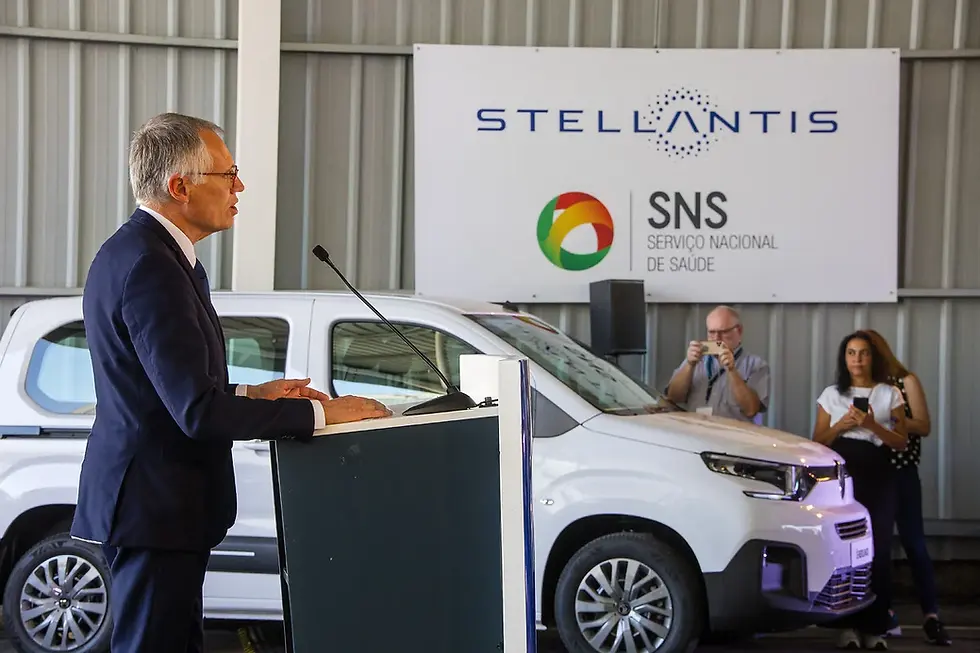Stellantis: the Mangualde factory produces its first electric cars
- Jérémy

- Jul 8, 2024
- 3 min read

The President of the Portuguese Republic, Marcelo Rebelo de Sousa, and the Minister for the Economy, Pedro Reis, attended the official inauguration of the production of electric vehicles at the Stellantis plant in Mangualde. This event marks a decisive turning point for the Portuguese automotive industry and for Stellantis, which is taking a further step towards the electrification of its product range.
With an investment of 119 million euros from the mobilisation programme, the Mangualde site will be the first factory in Portugal to produce light electric vehicles for people and goods on a large scale. Carlos Tavares, CEO of Stellantis, expressed his pride and underlined the company's commitment to sustainable mobility and decarbonisation. "We are witnessing a very important turning point in this production unit, which has been at the forefront of innovation," he said.
The Mangualde plant will produce eight 100% electric models, including the Citroën ë-Berlingo and ë-Berlingo Van, the Peugeot E-Partner and E-Rifter, the Fiat e-Doblò and the Opel Combo. This large-scale production will meet the needs of national and international markets. The site, which opened its doors 62 years ago, has undergone significant changes to accommodate this new production, including the creation of a new battery assembly line covering an area of more than 800 m². This modernisation has led to the creation of 63 new jobs, with specific training for the employees involved. The President of the Portuguese Republic underlined the importance of this progress for the Portuguese economy and industry, stating that "this factory, which is one of the three best in the world in terms of quality requirements and innovation, has an excellent team".
A commitment to sustainable mobility and carbon neutrality
The Mangualde project is part of Stellantis' "Dare Forward 2030" strategic plan, which aims to halve CO2 emissions by 2030 and achieve carbon neutrality by 2038. The Mangualde plant actively contributes to this goal thanks to its 6,370-panel photovoltaic park, which is capable of providing 32% of the plant's annual electrical energy needs, avoiding 2,500 tonnes of CO2 emissions per year. The medium-term objective is to achieve 50% energy autonomy by the end of 2025, thanks to green energy production and storage projects.
In addition to its technological and environmental advances, Stellantis won a mega public tender from the Ministry of Health to supply 719 electric vehicles to the Portuguese National Health Service (SNS). These vehicles, consisting of 300 Peugeot E-Rifter and 419 Citroën ë-Berlingo, will be used by the SNS's home care units throughout the Portuguese mainland. Carlos Tavares expressed his satisfaction with this success and affirmed that "the choice made by the Ministry of Health to convert the SNS fleet to ecological vehicles with zero local emissions fell on two of our models, already considered by professional customers to be the best in the world".
This sustainable mobility and electrification project for the SNS fleet is also part of the EU Recovery and Resilience Plan, with an investment of nearly €21 million. The vehicles delivered will benefit from an extended warranty of 5 years or 150,000 kilometres and will be equipped with dedicated charging stations. This initiative demonstrates Stellantis' commitment to providing environmentally friendly mobility solutions and contributing to the health of future generations in Portugal.
With these initiatives, Stellantis is not only producing electric vehicles, but also committing to be a major player in the transition to a green economy. By combining technological innovation, sustainable development and social responsibility, Stellantis is leading the way to a cleaner, greener future.





Comments